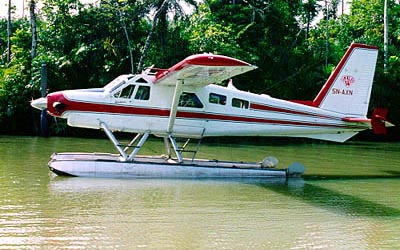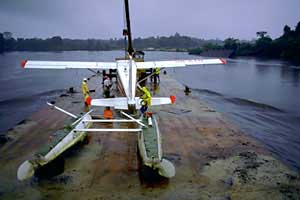![]()
![]() The story as it happened.
Join along right from the beginning on an adventure filled
journey as we fly up from the rainforests of Nigeria, over the Sahara Desert, Western
Europe and along the North Atlantic to Canada.
The story as it happened.
Join along right from the beginning on an adventure filled
journey as we fly up from the rainforests of Nigeria, over the Sahara Desert, Western
Europe and along the North Atlantic to Canada.
As It Happened: Follow our Route to bring the Turbo-Beaver back to Canada
![]()

The all Canadian Turbo-Beaver as rebuilt
by Viking Air in Sydney, B.C.
![]() I was tasked with bringing our
Turbo-Beaver back to Canada for a complete rebuild. After much
negotiations we gave the job to Viking Air in Sydney BC. Klaus was
supposed to be on leave but as he didn't want to miss out on the
excitement he decided to come along as my
co-pilot.
I was tasked with bringing our
Turbo-Beaver back to Canada for a complete rebuild. After much
negotiations we gave the job to Viking Air in Sydney BC. Klaus was
supposed to be on leave but as he didn't want to miss out on the
excitement he decided to come along as my
co-pilot.
Since there are very few
floatplane facilities enroute, we regret that we have to take the floats
off and put on the wheels for the trip. We draw straws as to who does the
first "wheel" take-off and landing.
![]() I get the honour. The bush strip which I made myself with a
D8 dozer is only 600 feet, but no problem for the Beaver. From the changeover
strip we make the short flight to Lagos where we outfit the ferry tanks.
I get the honour. The bush strip which I made myself with a
D8 dozer is only 600 feet, but no problem for the Beaver. From the changeover
strip we make the short flight to Lagos where we outfit the ferry tanks.
![]() Installing the ferry tanks are
a chore, because all the fitting are missing. That, of course, is a ferry
pilot trick where all the fitting are custom made and removed by the pilot
after delivery of the aircraft. Although they can't take the tanks back
they leave them disabled so that not just anyone can be hired to ferry
the aircraft next time without making a new set of ferry tanks.
Installing the ferry tanks are
a chore, because all the fitting are missing. That, of course, is a ferry
pilot trick where all the fitting are custom made and removed by the pilot
after delivery of the aircraft. Although they can't take the tanks back
they leave them disabled so that not just anyone can be hired to ferry
the aircraft next time without making a new set of ferry tanks.
![]() That is unless you have a
machine shop. With calipers, a tap and die set, and the machine shop tools
we quickly replace the original custom fittings using salvaged parts and
one small fuel drum bung slightly modified. The British engineer of the
company doing our Beaver's maintenance is not impressed and will not
"sign off" the ferry tanks.
That is unless you have a
machine shop. With calipers, a tap and die set, and the machine shop tools
we quickly replace the original custom fittings using salvaged parts and
one small fuel drum bung slightly modified. The British engineer of the
company doing our Beaver's maintenance is not impressed and will not
"sign off" the ferry tanks.
![]() I argued that since
the ferry tank fittings do not fall under the
certificate of maintenance we do not need to be signed off by
an engineer. A pilot can sign it off. On our test flight I discover,
however, that the machined plug we used has only 1/2 the flow of the original, and
the engine is burning fuel faster than the fuel pumps can deliver from
the ferry tanks. I calculate that we can still depart without delay as with a
worse case scenario our total burn will equal about 10 hours instead of
the planned 13 hours. If we power back for several hours during the flight
the fuel pumps can manage to catch up with the burn and we can make up the
difference. I take the responsibility to go ahead with the flight, and we
depart on the scheduled hour.
I argued that since
the ferry tank fittings do not fall under the
certificate of maintenance we do not need to be signed off by
an engineer. A pilot can sign it off. On our test flight I discover,
however, that the machined plug we used has only 1/2 the flow of the original, and
the engine is burning fuel faster than the fuel pumps can deliver from
the ferry tanks. I calculate that we can still depart without delay as with a
worse case scenario our total burn will equal about 10 hours instead of
the planned 13 hours. If we power back for several hours during the flight
the fuel pumps can manage to catch up with the burn and we can make up the
difference. I take the responsibility to go ahead with the flight, and we
depart on the scheduled hour.
![]() After getting our military
over-flight permits for the next two countries, we head North. There will
be nine countries and seven fuel stops altogether.
After getting our military
over-flight permits for the next two countries, we head North. There will
be nine countries and seven fuel stops altogether.

Changing the Turbo-Beaver to wheels on the barge
and floating it
over to the bush strip in the jungle.
Article and Images by John S Goulet
![]()
![]() Tamanrasset Travel Dialogue. From Rainforest to
the Sahara Desert
Tamanrasset Travel Dialogue. From Rainforest to
the Sahara Desert
![]() Alicante North Africa to
Spain and across Europe
Alicante North Africa to
Spain and across Europe
![]() Southampton /
Aberdeen VFR through the heart of
Britain
Southampton /
Aberdeen VFR through the heart of
Britain
![]() Reykjavik Crossing the cold North Sea to
warm by the heat of
Reykjavik Crossing the cold North Sea to
warm by the heat of
active volcanoes
![]() Narsarsuaq Across the wind swept North
Atlantic to the land of Ice
Narsarsuaq Across the wind swept North
Atlantic to the land of Ice
![]() Goose Bay! Navigating the Davis
Strait to our point of entry into
Goose Bay! Navigating the Davis
Strait to our point of entry into
Canada
Note from the Editor.
To browse the rest of the web site let
the attitude indicator take you back to the Virtual Horizons home page.
Last modified on April 22, 2020
.
© Virtual Horizons, 1996.